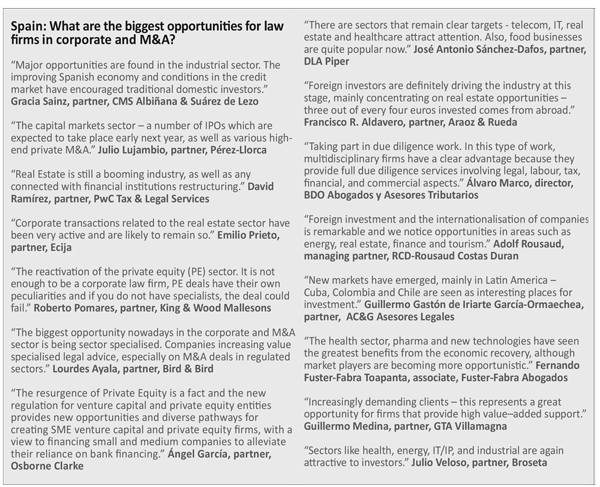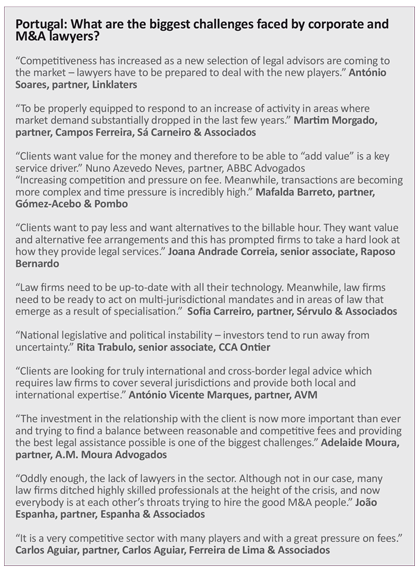Company & Corporate Report 2015: Investors on edge
M&A activity in Iberia is on the increase, in part due to the availability of cheap finance – however, there are fears political instability could derail transactions
Money is cheap at the moment. Companies have a wealth of options when it comes to securing finance for acquisitions, including credit funds or private equity funds. In general, the role of banks as providers of finance is waning. Consequently, there has been a healthy level of M&A activity in Iberia in the energy, telecoms and banking sectors. The bad news for law firms is that the market for corporate and M&A-related legal advice is becoming more competitive, with the result that there is increasing pressure on fees. Another challenge for law firms is how to adapt to an environment in which in-house legal teams are becoming increasingly adept at handling corporate and M&A matters that may have previously been outsourced to external lawyers. However, despite these concerns, M&A lawyers are optimistic about the year ahead.
According to Jorge Vázquez, partner at Ashurst, there is an increasing trend in which companies are looking at different ways to obtain financing. “For example, there may be credit funds that provide financing for a longer term – at some additional cost – which can be made to match the exit strategy of the investor, thus taking refinancing concerns away from the table for a long period.” He adds that another significant development in the last year has been changes to the insolvency law, which means companies which came out of insolvency have a window of opportunity to make changes to the CVA’S (convenios) agreements they have with creditors.
Clifford Chance partner Javier García de Enterría points out that the market is currently characterised by the availability of many sources and providers of financing and, consequently, there is a lot of “cheap money” available. Alternative financing formulas that improve conditions for borrowers, such as ‘Term Loan B’ structures, are emerging says Linklaters partner Alejandro Ortiz. He adds: “These provide borrowers with some of the advantages of the high yield bond structures, but without their inconveniences in terms of costs, for example.” In addition, private equity funds are also looking to invest in Spain, according to Roca Junyent partner Jaime Espejo Valdelomar. He continues: “Private equity funds have fresh cash and they are looking for opportunities.”
Banks’ role diminishes
There has also been a recovery in the capital markets, which has generated funding through listings, according to Cuatrecasas Gonçalves Periera partner Federico Roig. He adds: “We´re seeing AIM-listings for deals in Spain – there is also a lot of cash available and interest rates are low, however will interest rates remain low?” Gómez-Acebo & Pombo partner Fernando de las Cuevas says that one of the trends in the market is the “diminishing role of banks” in providing finance – he points out that this is demonstrated by the fact that while, in Europe, 80 per cent of financing is still provided by banks, in the US around 80 per cent of financing is supplied by “non-banks”, such as funds and capital markets, for example.
An “improvement in valuations” is incentivising M&A activity, according to Uría Menéndez partner Juan Martín Perrotto. He continues: “The devaluation of the Euro brought a number of investors into the market, while new players were also attracted by energy reforms. We’re also seeing consolidation in the telecoms, energy and banking sectors.”
M&A activity and liquidity is increasing at a good pace, according to Lener partner Álvaro López-Chicheri. “However, there are not that many companies that are in a good condition to receive investment – capital is ‘anti-risk’ and funds are doing a lot of due diligence,” he adds. Ortiz says that there are some potential transactions in Spain that are on hold as companies wait to have “another year of good results”.
Uncertainty in an election year in Spain could impact on investment, according to De las Cuevas, who highlights one party’s proposal to do away with the recent labour reform as having the potential to unsettle investors. Meanwhile, Espejo Valdelomar believes echoes the imminent Spanish elections have led to a slowing of M&A activity.
 ‘Dual track’ trend
‘Dual track’ trend
Perrotto says that in the case of some deals, acquirers have been allowed to pay the price in cash or any other marketable security, that is a listed security with a certain rating. He adds: “There have also been pre-emptive bids where the bidding process is cancelled upon one bidder offering a price significantly higher than the sellers’ expectations, and the vendor talks to one bidder, derailing the auction process.” Freshfields Bruckhaus Deringer partner Armando Albarrán says that “dual track” acquisitions have been a continuing trend in the last year.
Vázquez says that there is often pressure from clients for law firms to act as the “escrow agent”, that is the body responsible for transferring the monies from one party to another when certain conditions are met. “There are problems getting Spanish banks to be escrow agents,” he adds.
Meanwhile, Perrotto says M&A transactions are now largely “lockbox” deals. In a lockbox transaction, the parties agree a fixed price calculated using a balance sheet [relating to the target] that has been prepared before the date for the signing of the sale and purchase agreement. Consequently, cash, debt and working capital as at the date of the reference accounts are therefore known by the parties at the time of signing and there is no post-completion adjustment.
With regard to legal fees, Espejo Valdelomar says that they will “never reach the pre-crisis levels due to the strong competition in the legal market”. Perrotto claims that there has been a slight increase in average billing rates in the last 12 months. One partner puts the increase at “around five per cent”. Allen & Overy partner Iñigo del Val says his firm tries to increase profitability by “being innovative in the way in which legal services are delivered rather than purely increasing fees”. Backer & McKenzie partner Maite Diez adds that foreign clients, with the exception of Chinese clients, are generally “more understanding” than Spanish clients when it comes to legal fees.
The market for M&A-related legal advice is much more competitive than other sectors in which there are fewer qualified law firms and this is having an “impact on fees”, according to García de Enterría. Vázquez adds that clients increasingly see legal services as a commodity and, consequently, clients “sometimes don´t care if they change firm every time they need legal advice in Europe”. García de Enterría says that one of the main factors in the M&A market is that large law firms are facing some difficulties in being efficient when it comes to performing due diligence, in particular when compared with other players such as the legal arms of the audit firms. Meanwhile, some large multinationals are conducting M&A-related due diligence in house, according to Diez. Roig adds that, while large domestic companies in Spain may have strong in-house legal teams, they still outsource high value work and “pay higher fees” for such work. He continues: “All firms now have very efficient [M&A] teams and we will have more of a recovery in fees this year.”
 Price isn’t everything
Price isn’t everything
Albarrán says the market dynamics have “improved significantly”. He adds: “There is more activity, more deals, while pricing is not always the main driving factor – pitches are not always lost on price, relationships are important to clients.” The legal market is getting more competitive due to new players entering the market and all the leading firms pitching for the top-end work, according to del Val. He adds: “With due diligence we have to manage teams and the efficiency of the delivery, it’s about getting proficient at each type of work you are doing.”
Perrotto argues that, while it may not be the end of hourly rates, it is close to the end from the perspective of many clients. “Clients surf the web, talk to peers, they have information and they have knowledge – they know what they want, and they want value delivered in the form of solutions that are commensurately compensated,” he adds. Espejo Valdelomar says clients are becoming more professional in terms of their legal knowledge. “Once, a client requested that we check a contract that they had drafted using Google – M&A lawyers must contribute to a successful deal something more than a good contract,” he says.
A lot of investment is moving away from emerging economies and now being channelled into more sophisticated markets, according to Vázquez. Ortiz adds that there are now more complex and multijurisdictional M&A deals and, consequently, project management is becoming more important in relation to larger deals. Sharon Izaguirre, partner at Deloitte Abogados, says clients are increasingly asking for cross-jurisdictional M&A advice, and requesting “cross-functional advisory services with a deep understanding of the industry and the client’s business”. She adds: “The perception of the ‘Big Four’ firms is changing and clients are increasingly using them throughout the entire corporate process of M&A deals, rather than only for due diligence.”
Due to the fact that 2015 has been an election year in Spain – with the general election also coming up – there has been some uncertainty for investors, according to Vázquez. However, he says there has been a “recovery in the retail sector, a bit less unemployment and more investment in hotels and the leisure industry”. Albarrán is optimistic about the year ahead: “There will be four, five or six big transactions that should each offer roles for three, four or five law firms.” López-Chicheri says he is optimistic about the coming year partly because private equity funds have an “excess of money and have to invest in mid-sized markets”. But he adds: “Spain still has fundamental economic problems which will determine the speed of post-crisis recovery and affect M&A.”
Diez argues that Spain is currently in favour with foreign investors. “Investors from the UK, the US and Asia are making acquisitions, particularly in the industrial sector,” she adds. “However, law firms will have to adapt to a new business model, pricing will be different, and we will have to change the way we measure lawyers’ productivity.”
Good companies for sale
Roig believes uncertainty among investors about the Spanish economy has been overcome. “In the past, investment funds wouldn´t invest because of regulatory uncertainty and instability,” he says. “But now there is a lot of cash in the market, the M&A industry is fuelled by having cash and good assets – we have good companies and buyers and sellers valuations now match.” Meanwhile, Izaguirre points out that the nature of the legal services required by clients is changing: “Traditional legal advice is no longer sufficient in an increasingly specialised international market. Companies are increasingly looking for business solutions which, together with providing an integrated legal advisory service, incorporate financial, industry-related and other aspects.”
Ortiz says among the biggest challenges facing law firms is fiercer competition, which places demands on firms to be more efficient. He adds: “Another challenge is the retention of talent, young lawyers now tend look more to the short to medium term.” In addition, law firms in Spain face the prospect of increased competition from US firms, according to Ortiz: “US firms are becoming stronger in Europe where the use of US financing is an increasing trend.” Albarrán says that the legal profession is changing, and that, while change may be difficult, “it is not realistic to think things will continue as they are”.
Portugal: Private equity interest
The Portuguese M&A market is more active, and there have been a significant number of deals in the industrial and energy sector in particular, according to Abreu Advogados partner José Maria Corrêa de Sampaio. He adds: “International funds, such as those from the UK, for example, are more active as are Spanish companies.” MLGTS partner Luísa Soares da Silva says there has been considerable consolidation in the banking and insurance sectors.
She continues: “We have seen the entry of private equity funds into the Portuguese market – there has also been a shift in the origin of investment, which has started to come from emerging markets such as Angola and China, which are countries that have been targets for investment and now are also sources of investment in Portugal.” Chinese investors are using Portugal as a platform from which to enter other markets, including the European market, says Cuatrecasas, Gonçalves Pereira partner Vasco Bivar de Azevedo. He adds: “The Chinese are trying to buy assets in England, while two of the bidders for Portugal’s Novo Banco were Chinese.”
Octávio Castelo Paulo, partner at SRS Advogados, says that, due to interest from private equity funds, there is an “interesting pipeline” of deals, with the technology and life sciences sectors witnessing a number of transactions. According to PLMJ partner Manuel Santos Vitor, in the last year there has been investment in Portugal from both emerging economies and, in a new development, more mature economies such as the US and UK. Linklaters partner Antonio Soares, who is the firm’s head of corporate finance in Lisbon, says that, due to the collapse of Espírito Santo Group, a lot of good assets appeared on the market. “The size of the assets justified private equity interest, while corporate governance came under the spotlight and regulators were under pressure,” he adds.
The BES crisis had a “positive systemic impact on Portugal”, according to FCB – F. Castelo Branco & Associados partner João Couceiro. “It [the BES crisis] led to restructurings and all sectors – particularly real estate and transport – are now developing as they create more synergies,” he adds. Bivar de Azevedo says that companies that belong to major groups are now beginning the process of deleveraging and that this leads to “medium-sized” M&A deals. He adds that Lisbon is also becoming an important hub for technology start-up companies. Bivar de Azevedo continues: “We are now seeing more creative M&A deals with venture capitalists taking stakes in companies.” Alexandre Jardim, partner at Pbbr, says acquisitions, rather than mergers, are currently more common in the Portuguese market. He adds: “Portugal’s start-up movement is becoming interesting and is a good opportunity for lawyers.”
Crowdfunding to the rescue? 
However, with regard to advising start-ups, Couceiro says the challenge for law firms is having to share the risk with the clients. Vieira de Almeida partner Cláudia da Cruz Almeida says law firms may regard advising start-ups “not only in a strict business perspective but also as having a social responsibility element”. She adds: “Advising on seed stage start up is a particularly good opportunity to be seized by young people in law firms and also a good way to engage them.” Da Cruz Almeida says that Portugal needs to “treasure its entrepreneurial capacity, which is largely media-driven not revenue driven”. She continues: “We´ve witnessed some very good deals involving German investors – a lot of companies in Portugal began as start-ups.” If, foreign investment slows down, Portuguese entrepreneurs will face a challenge, according to Jardim. “Their [entrepreneurs’] challenge will be how to raise money – there is a lot of expectation placed on crowdfunding and this will be very interesting,” he says.
The Portuguese M&A market has undergone a significant revival in the view of Martim Anahory, partner at Serra Lopes, Cortes Martins. “In the third quarter of this year, the volume of deals doubled – there was around €4 billion of business and it was mostly classic M&A,” he says. Soares says that, whereas in the past, M&A was largely taking place in “distressed situations, but now private equity funds are selling to other private equity funds”. However, future developments in the market are difficult to predict, says Uría Menéndez partner Francisco Brito e Abreu. “There’s a conjunction of several factors, there is interest from foreign investors and still a lot of restructuring going on, but at this point the political situation is somewhat uncertain,” he says.
Law firms are under pressure with regard to rates, says Soares. He adds: “The model has changed, clients want law firms to share risk, while there are fixed-fee caps – it’s difficult to increase fees.” Santos Vitor adds: “We have more work, we are generating more revenue, but margins have not increased in a relevant way – we won´t be going back to billable hours, and now there are more detailed letters of engagement.” According to Da Cruz Almeida, law firms need to talk to clients at an early stage about the “planning of resource-intensive projects such as due diligence, and ask them what they want and measure the product being provided”. She adds: “There needs to be more of a focus on project management, we are in the business of law.” Soares da Silva says lawyers are asked to “stand in clients’ shoes” more and have a deeper understanding of their business.
‘Big Four’ on the march
Corrêa de Sampaio says another issue facing law firms is the possibility of the auditing firms entering the Portuguese legal market. “The ‘Big Four’ want to come,” he says. However, Bivar de Azevedo is not overly concerned about auditing firms entering the market: “If you analyse what happened in Spain, the major law firms are still the preferred choice of clients.” He adds that there will be some resistance to the entry of auditors into the legal market. “Here, there is still the idea that clients are better protected with traditional law firms where the confidentially or conflict of interests mechanisms are predominant and that these could be jeopardised by multi-disciplinary practices,” Bivar de Azevedo says.
Soares da Silva says that, despite concerns about political instability, and the crisis in China, she envisages M&A activity increasing in the coming year. “I´m confident we’ll have more foreign investment and there needs to be more consolidation to foster growth,” she adds. Anahory says that while there is risk associated with the country’s political instability, Portugal has “good assets at competitive prices” that will attract investors. Castelo Paulo argues that with possible elections in 2016, there are “question marks” regarding foreign investors’ trust in Portugal.
Couceiro says work is being created for lawyers due to disinvestments being made by private equity funds. Vitor says that he is optimistic about the coming year. “It depends a lot on what happens outside Portugal, but European GDP is expected to grow and the US economy is expected to grow so the fundamentals are good.”
Balance sheets improving
One of the major challenges for law firms is managing the expectations of clients, according to Soares. “They are demanding in terms of time and the flow of documentation, but you have to explain that more speed means more risk,” he says. “On the positive side, private equity investments in Portugal are medium term investments and we will have private equity exits as well.” In the last two years, most Portuguese companies have improved their balance sheets and operating cash flows, Bivar de Azevedo says. But he adds: “But they are still highly leveraged and must therefore deleverage sometimes though the introduction of a new shareholding.” Meanwhile, Bivar de Azevedo says the start-up sector in Portugal will lead to more innovative and creative M&A work. Corrêa de Sampaio says it is important that Portugal continues to maintain the economic policies and the tax regime that have produced such good results to date. He adds: “This needs to be an investor-friendly country.”












